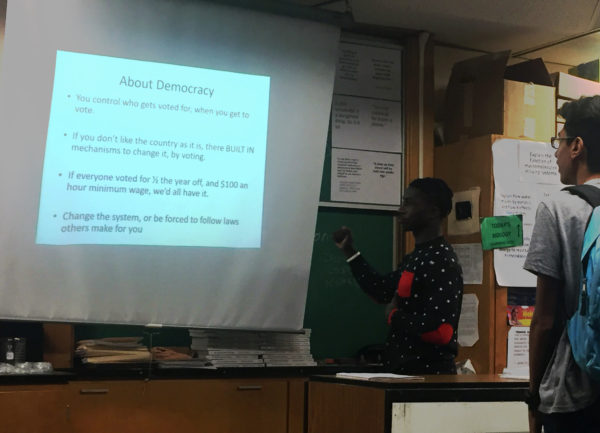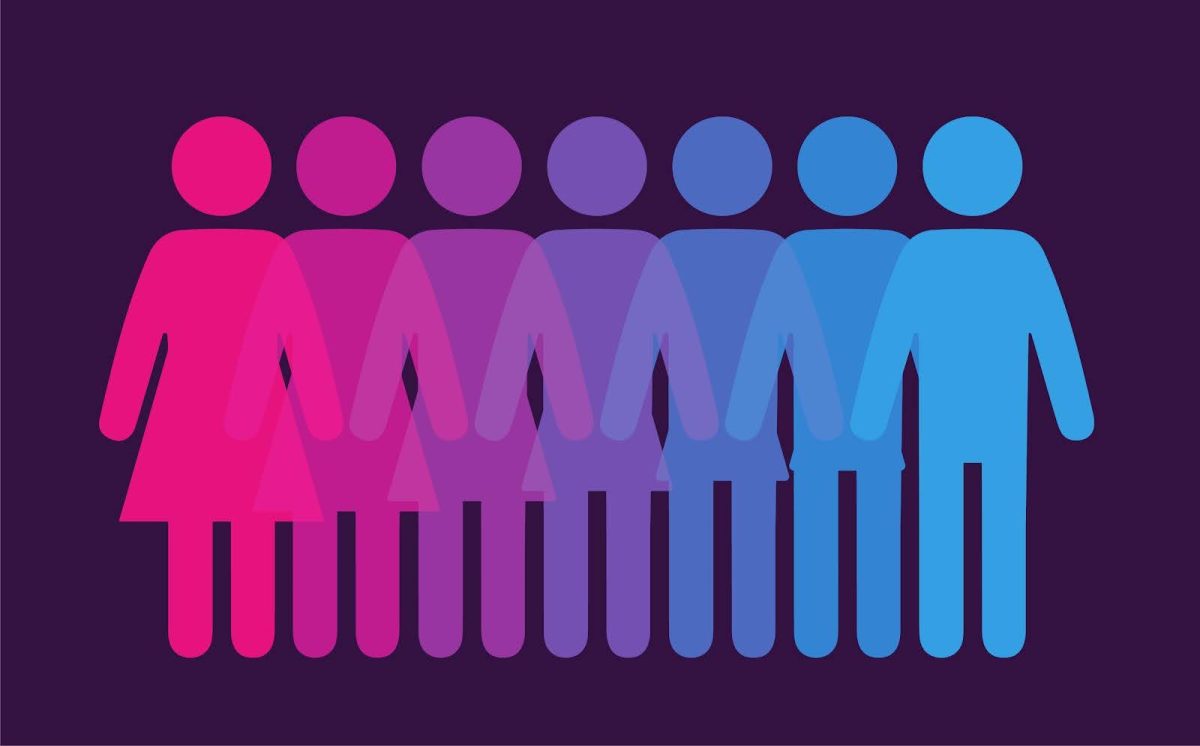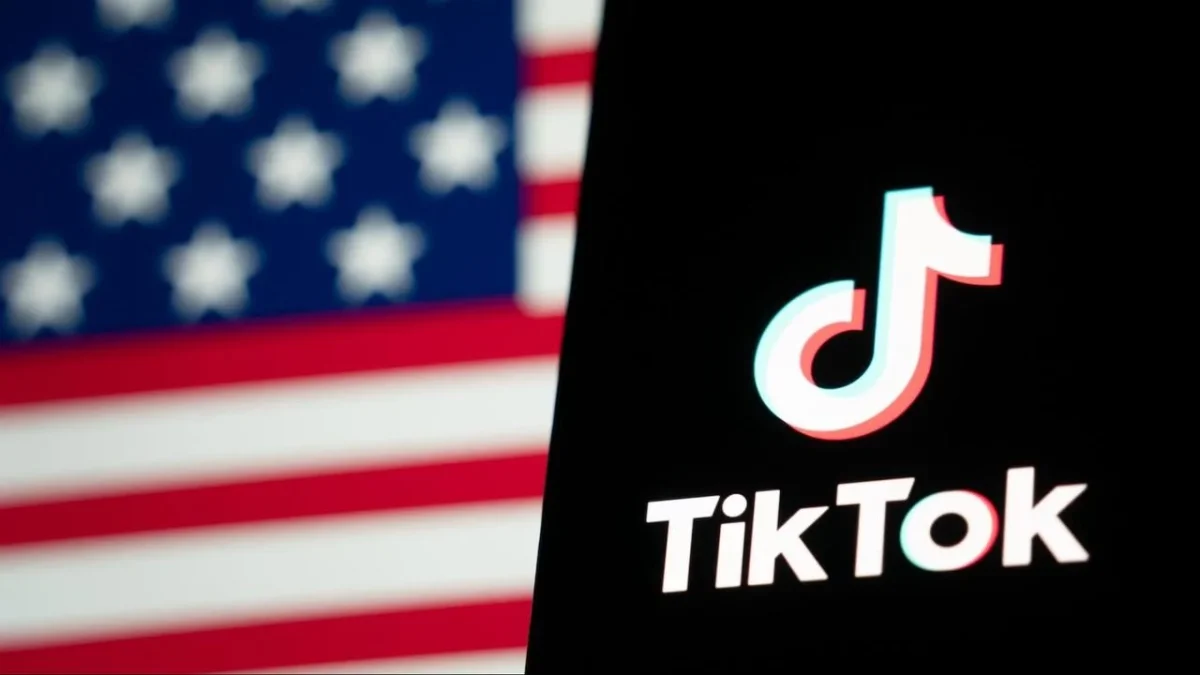Feature Photo By: Vanessa Guereca- Senior David Aggrey stands with his fist in the air during The Pledge of Allegiance. He faced the democracy slide that was projected on the board in his AP Biology class.
I walk into my third period science class. As usual, I set my backpack down, take out my notebook and await the “beep, beep, beep” of the intercom for the daily announcements. My heart begins to race as the ending approaches and the Pledge of Allegiance begins; my teacher tells us to stand up every day.
“Now, will you please stand up for the Pledge of Allegiance.”
Every day those words are repeated, and when I hear them, I ground myself; I suddenly feel the chair under me push up against me as I stay seated — in my own silent protest about the direction I see my country going — as each word is being recited by those around me to “pledge to the flag.”

But today it is different. Today, I feel not only frowned upon for my stance, but attacked.
“It makes me so sad to not see everyone stand up,” my biology teacher says. “Aren’t you proud to be American?”
I reply to my teacher with the fact that we — as public school students — have protected our silent protests like this one under the First Amendment, yet he ignored me and continued to rant about the disrespect.
I do not stand up for the Pledge of Allegiance, and I have not for two years now, but I do respect those who stand by remaining silent during that time. The Pledge is something that is implemented into our school system since we are in elementary school. Of course, as kids, we listen to our teachers; we stood up, pledging to a piece of cloth, not knowing the significance.
There is no law that says that we are required to stand for the Pledge; though, there is a law that grants that schools in 43 states — including Colorado — are required to provide the pledge of allegiance. In Colorado though, students have the option to recite the pledge. Keyword: option.
The First Amendment consists of five freedoms:
- Freedom of Religion
- Freedom of Speech
- Freedom of the Press
- Freedom to Assemble
- Freedom to Petition
Under the First Amendment, I have the right to sit during the Pledge, and I have the right to not recite it, as I am peacefully protesting, peacefully expressing my beliefs that I have towards our government and policies.
These five freedoms of the First Amendment absolutely do not go away at Rangeview’s doorstep.
Not to mention, certain parts of the Pledge are even against some people’s religion.
“Under God.”
There are some students that omit the phrase, others do not recite the Pledge at all, but that’s okay under the First Amendment. The Freedom of Religion states that anyone in the United States has the right to practice any religion or no religion at all; therefore, if a person chooses to not recite the Pledge for that one word, it is perfectly fine. This is what really “makes America great.”
Junior Nick Lambert says that he does not stand for the pledge. His reason being, “I don’t like the way this country is run. I don’t want to pledge allegiance to a country that I don’t know if I’m going to be sticking around with much longer.”
Students have also pointed out other staff members, such as media center staff, making students stand up during the Pledge. Though it is understandable that many teachers and adults have their reasons for their respect to the flag, there should also be that mutual understanding for those who do not stand, for those who kneel, for those who hold their fist high.
Furthermore, adults in this building should have a clear understanding that students’ First Amendment rights allow them the right to sit during the Pledge. Period.
I do believe that there should be a respectful silence for those who do recite the Pledge. It is something very sacred to many, such as my third period teacher, and I respect his right and beliefs.
To others, there’s no meaning. I cannot pledge to a cloth that represents my freedom, yet I don’t feel free. In fact, I live every day in fear of getting home and not finding my parents.
I feel by pledging to the flag, I am pledging to support a government run by a bunch of wealthy fools that have never dealt with the poor, fools that have never been women, fools that are not the minority.
Under the First Amendment, those who kneel, those who sit, those who hold their fist high, are protected.
Not everybody has the same experiences. Some people have had family in the Armed Forces and are very patriotic about the Pledge.
I get that.
But all I am asking is for teachers and adults like my science teacher to understand that there is a reason for not standing. There are different experiences that come to students’ minds when we look at the flag, experiences that do not deserve to be pledged to.
Whether it be for religious reasons, social injustice, or other experiences that shape opinions, students are not required to stand for the Pledge and teachers cannot force them to stand.
Whether teachers tell us to stand to make us feel guilty or to follow peer pressure, they will have to review the First Amendment and try again.
I stand my ground: I choose to sit.
Make sure to check out this related opinion piece on the First Amendment rights minors have at school but usually do not know about:
http://rangeviewraiders.info/?p=10238






